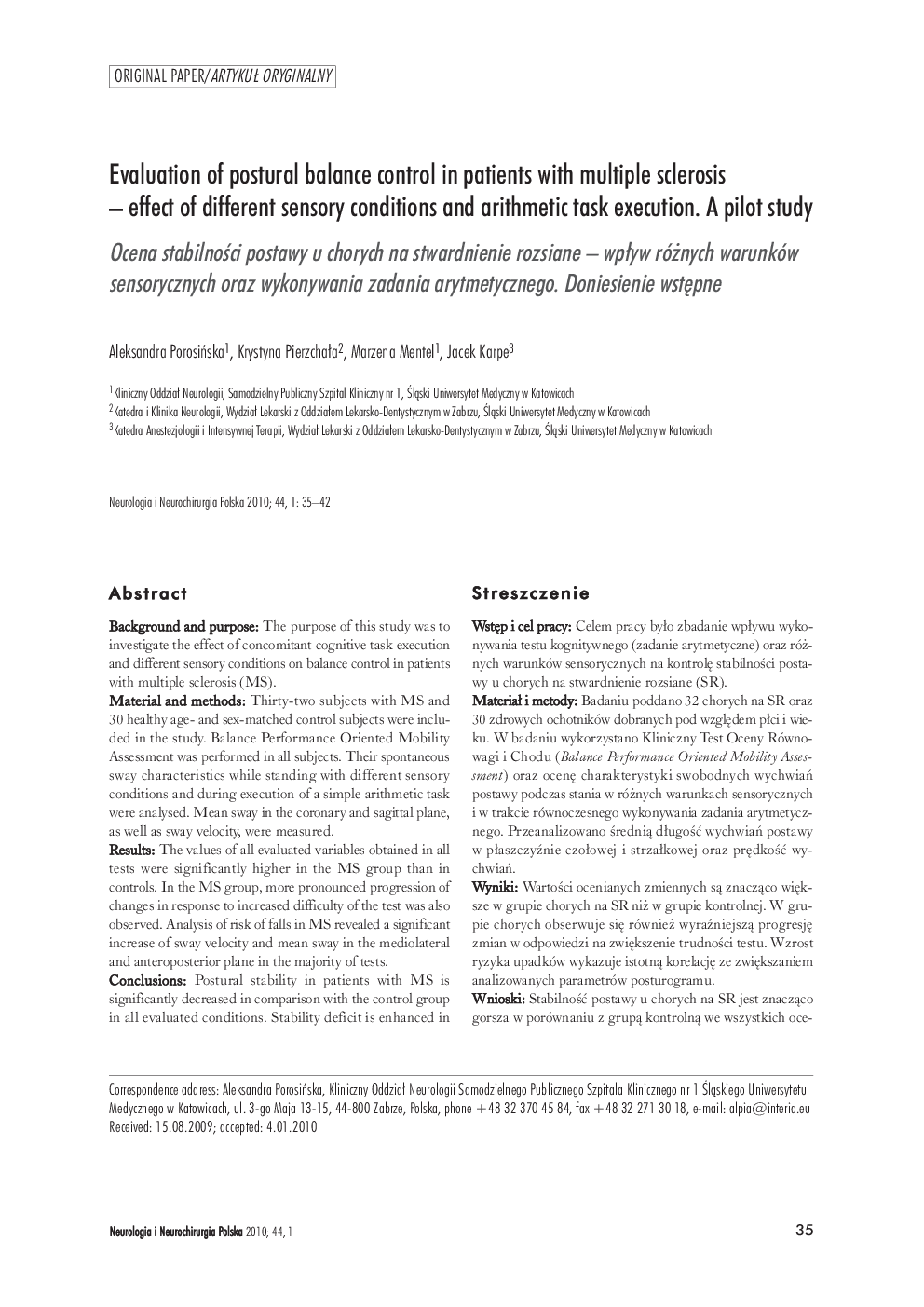| کد مقاله | کد نشریه | سال انتشار | مقاله انگلیسی | نسخه تمام متن |
|---|---|---|---|---|
| 2153238 | 1090162 | 2010 | 8 صفحه PDF | دانلود رایگان |

Background and purposeThe purpose of this study was to investigate the effect of concomitant cognitive task execution and different sensory conditions on balance control in patients with multiple sclerosis (MS).Material and methodsThirty-two subjects with MS and 30 healthy age- and sex-matched control subjects were included in the study. Balance Performance Oriented Mobility Assessment was performed in all subjects. Their spontaneous sway characteristics while standing with different sensory conditions and during execution of a simple arithmetic task were analysed. Mean sway in the coronary and sagittal plane, as well as sway velocity, were measured.ResultsThe values of all evaluated variables obtained in all tests were significantly higher in the MS group than in controls. In the MS group, more pronounced progression of changes in response to increased difficulty of the test was also observed. Analysis of risk of falls in MS revealed a significant increase of sway velocity and mean sway in the mediolateral and anteroposterior plane in the majority of tests.ConclusionsPostural stability in patients with MS is significantly decreased in comparison with the control group in all evaluated conditions. Stability deficit is enhanced in response to more difficult conditions of evaluation. Increased risk of falls is related to the increased postural sway velocity and length of mean sway; this association is most pronounced in the coronary plane.
StreszczenieWstęp i cel pracyCelem pracy było zbadanie wpływu wykonywania testu kognitywnego (zadanie arytmetyczne) oraz różnych warunków sensorycznych na kontrolę stabilności postawy u chorych na stwardnienie rozsiane (SR).Materiał i metodyBadaniu poddano 32 chorych na SR oraz 30 zdrowych ochotników dobranych pod względem płci i wieku. W badaniu wykorzystano Kliniczny Test Oceny Równowagi i Chodu (Balance Performance Oriented Mobility Assessment) oraz ocenę charakterystyki swobodnych wychwiań postawy podczas stania w różnych warunkach sensorycznych i w trakcie równoczesnego wykonywania zadania arytmetycznego. Przeanalizowano średnią długość wychwiań postawy w płaszczyźnie czołowej i strzałkowej oraz prędkość wychwiań.WynikiWartości ocenianych zmiennych są znacząco większe w grupie chorych na SR niż w grupie kontrolnej. W grupie chorych obserwuje się również wyraźniejszą progresję zmian w odpowiedzi na zwiększenie trudności testu. Wzrost ryzyka upadków wykazuje istotną korelację ze zwiększaniem analizowanych parametrów posturogramu.WnioskiStabilność postawy u chorych na SR jest znacząco gorsza w porównaniu z grupą kontrolną we wszystkich ocenianych testach. Deficyt stabilności powiększa się w odpowiedzi na utrudnianie warunków badania. Zwiększenie ryzyka upadków wiąże się ze zwiększeniem prędkości i długości swobodnych wychwiań postawy, a związek ten jest najsilniej wyrażony w płaszczyźnie czołowej.
Journal: Neurologia i Neurochirurgia Polska - Volume 44, Issue 1, 2010, Pages 35–42